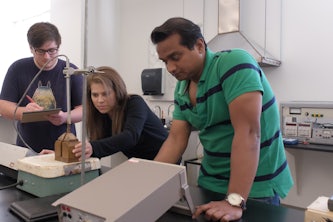In the media: Car companies are pouring billions into self-driving tech they may never use, experts say
Dean Aaron Bobick says self-driving technology won't be simple for car companies.
Dean Aaron Bobick says self-driving technology won't be simple for car companies. >> Read the full article on thisisinsider.com
As the age of self-driving vehicles approaches, the auto industry may be facing the most significant transformation in its history.
Once cars are able to drive themselves, the relationship between auto companies and their customers will change, as vehicles will be just one piece in a larger network of services, rather than an all-purpose transportation solution used exclusively by a single owner.
That means traditional auto companies have to make one of two difficult choices as they plan for the future, according to Matt Trotter, the managing director of hardware and frontier technology at Silicon Valley Bank. They can either continue to focus on vehicle manufacturing and accept the fact that an increasing percentage of auto industry profits will be taken by the companies that own self-driving technologies and services, or take a gamble and invest heavily in those areas with the knowledge that they may get beat by an auto rival or tech company, he said.
In a 2017 study, Intel and Strategy Analytics projected that the global market for autonomous driving technology will be worth $7 trillion in 2050. That's why automakers are spending billions of dollars acquiring autonomous driving startups and developing services that may overtake traditional vehicle ownership in the coming decades. But the auto industry's traditional giants aren't alone. They'll face significant competition from startups like Aurora and Zoox, and major tech companies like Waymo, Uber, and Apple that arguably have more expertise in writing software and may have an advantage in attracting top engineering talent.
Automakers will need to be self-driving experts
As the battle for the future of the auto industry heats up, one big question has yet to be answered: Will multiple self-driving systems be able to coexist, or will every automaker be forced to buy the best available self-driving technology? You might be able to get away with having a battery whose range is 15% worse than the best available competitor's, but will the same be true of a self-driving system that's 15% more likely to become confused at stoplights or cause avoidable accidents?
If most automakers will end up licensing someone else's self-driving technology, then the billions they're spending now could end up looking like a tremendous waste. But it's not that simple.
According to Aaron Bobick, dean of the school of engineering and applied science at Washington University in St. Louis, autonomous driving systems won't be the kind of technology an auto company can just buy off the shelf and plug into their vehicles.
"One could argue it may be the most complicated technology that anyone has ever deployed in terms of the complexity of the environment in which this thing has to act and, frankly, both the upsides and the downsides of being successful," he said.
Automakers will need significant expertise to make sure their vehicles work in harmony with self-driving systems, which means devoting serious resources to developing those systems could pay off whether they use their own or someone else's, Bobick said.
That means traditional auto companies have to make one of two difficult choices as they plan for the future, according to Matt Trotter, the managing director of hardware and frontier technology at Silicon Valley Bank. They can either continue to focus on vehicle manufacturing and accept the fact that an increasing percentage of auto industry profits will be taken by the companies that own self-driving technologies and services, or take a gamble and invest heavily in those areas with the knowledge that they may get beat by an auto rival or tech company, he said.
In a 2017 study, Intel and Strategy Analytics projected that the global market for autonomous driving technology will be worth $7 trillion in 2050. That's why automakers are spending billions of dollars acquiring autonomous driving startups and developing services that may overtake traditional vehicle ownership in the coming decades. But the auto industry's traditional giants aren't alone. They'll face significant competition from startups like Aurora and Zoox, and major tech companies like Waymo, Uber, and Apple that arguably have more expertise in writing software and may have an advantage in attracting top engineering talent.
Automakers will need to be self-driving experts
As the battle for the future of the auto industry heats up, one big question has yet to be answered: Will multiple self-driving systems be able to coexist, or will every automaker be forced to buy the best available self-driving technology? You might be able to get away with having a battery whose range is 15% worse than the best available competitor's, but will the same be true of a self-driving system that's 15% more likely to become confused at stoplights or cause avoidable accidents?
If most automakers will end up licensing someone else's self-driving technology, then the billions they're spending now could end up looking like a tremendous waste. But it's not that simple.
According to Aaron Bobick, dean of the school of engineering and applied science at Washington University in St. Louis, autonomous driving systems won't be the kind of technology an auto company can just buy off the shelf and plug into their vehicles.
"One could argue it may be the most complicated technology that anyone has ever deployed in terms of the complexity of the environment in which this thing has to act and, frankly, both the upsides and the downsides of being successful," he said.
Automakers will need significant expertise to make sure their vehicles work in harmony with self-driving systems, which means devoting serious resources to developing those systems could pay off whether they use their own or someone else's, Bobick said.



